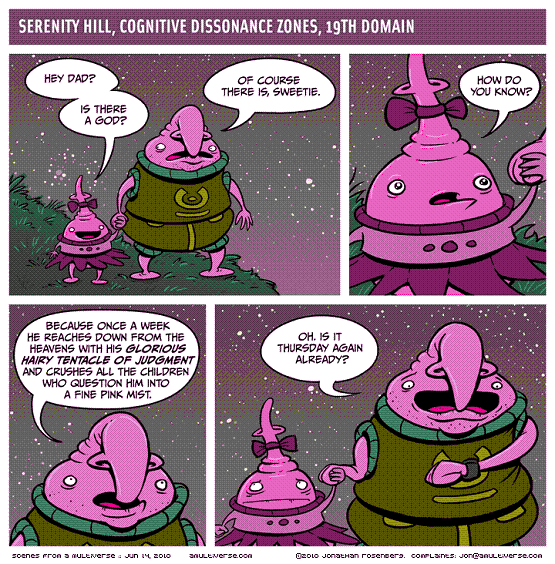Religious experiences, near death experiences, mystical oneness, spiritual feelings: How are they experienced in our brain? What bearing does this have on the question of God’s existence or our escape from Samsara? Bill continues his guest post from part one:
|
The lobes in the mind become active from some source of input, and your mind reacts to that stimulation.
For example, there are localized spots in two lobes (the nucleus accumbens and the ventral pallidum) which, when activated, give you a deep sense of pleasure. (Aw, come on, there has to be something in the brain that causes the pleasure sensation). An experiment with Rhesus monkeys (who have similar spots) involved giving them a button, which when pressed, stimulated their pleasure centers. If left to their own devices, those monkeys would have starved themselves to death as they became fixated in a non-stop cycle of pressing their button.
When someone tells you that the purpose of human life is to seek pleasure, it is not impossible for that purpose to be fulfilled by a suitably engineered helmet.
The lobes in the human brain fall into two broad groups: the four lobes that make up your conscious mind, and all the others that make up your subconscious.
|

|
A large number of activities in the sub-conscious are reflex conditions that have evolved over time, and exist in us because that reflex in ancient times made our specific ancestors survive in primitive settings.
Being subconscious, we are not aware of the mechanism, but we are aware of the resulting emotion. Public speaking today is often difficult because our successful ancestors fled when surrounded by eyes, and survived. We have a built in reflex to want to flee when surrounded by the eyes of an audience.
Our personality is not inherited – it is a mix of life time experiences reacting with the underlying reflexes. And in acquiring our personality, we acquire our belief system.
There is constant feed back from those we trust as infants (infants who have trust in elders tended to live longer in primitive times, so we also have a built in trust during our infancy). This feedback influences our personality, and as a side effect, our belief system.
Some beliefs rapidly become self-evident through proof: pain is unpleasant and avoiding it is worthwhile.
Some beliefs become self-evident through repetition: if you are bad you will go to hell.
And some through reflexes giving us internal input-response relations. When I stroke a pet cat, it purrs and that gives me a pleasurable sensation. Therefore it is nice to stroke a pet cat.
Now, there was a relevant experiment that used human volunteers. It involved a helmet that stimulates the subject’s temporal lobe.
The temporal lobe’s prime purpose is to give us feelings of empathy with others – it meant that humans could work in packs a long time ago, and as teams nowadays.
When there is no one present, stimulation of the lobe causes the person to emphasize with no-one, and through a process known as agenticity, create some sort of “being” to account for the presence felt.
The device became to be known as “the God helmet”. It was placed on the subject’s head, the button was pressed, and the subject reported a sensation that was consistent with the subject’s core religious attitude.
It was found that the stimulation of a theist’s temporal lobe produced the presence of the relevant god, of a Buddhist led to a heightened oneness with the universe, and atheists reported a warm and fuzzy feeling that they couldn’t quite pin down.
To understand religious belief mechanisms properly, we need to tie to this phenomena those of the Limbic system and the three lobes that carry religious conviction. Then we shall be able to decide if religion is a by-product of stray neurological activity, or the way a God “tickles” lobes to confirm his presence to the believer.
– – – – – – – – – – – – – – – – – – – – – – – – – – – – – – – –
I was once in the triage ward of a hospital. I was waiting for surgery to deal with an internal burst blood vessel. In the early hours of the morning, my blood pressure caused an alarm to sound, and suddenly my bed was surrounded by several nurses and a doctor, doing all sorts of presumably coordinated activity. One nurse smiled at me, stuck a syringe in my arm and said “You are going to be ok” A few seconds later, I went to sleep, and when I woke up, all had been put good, and I was discharged a couple of days later.
Now – something very strange happened in the period between the needle jab and falling asleep.
I was suddenly aware that I was in the presence of an invisible (to me) entity that had an intellect vastly superior to my own. What is more, I instinctively “knew” that this being was totally aware of every single detail of my entire life.
When I was discharged, you might be curious as to why did I not run to church? Well, there was in my way of thinking a serious fault in what this superior being had done – or rather not done. Why had it arrived at that particular moment, and then simply watched as an idle bystander? Why no communication? And where was he or it all the rest of my life? This did not seem at all rational. And I found no solace in the catch-all “God moves in mysterious ways”.
I later came across a paper published by Dr R. Joseph. His research material showed that activation of the amygdala, hippocampus, and temporal lobe are responsible for religious, spiritual, and mystical trance-like states, dreaming, astral projection, near death and out-of-body experience, and the “hallucination” of ghosts, demons, angels, and gods.
These lobes are not part of the four bits that make up the conscious part of the brain. When stimulus in the subconscious turns on the images visible to the conscious, the conscious part of the brain has no idea where those images are coming from. And the conscious is absolutely certain that the images are not self induced.
More than one F-84 pilot flying at night, through a cone-of-silence, reported on landing safely that during the scariest part of the flight, they had hallucinated that they were sitting on the wing of their jet fighters, watching themselves fly the airplane. This was originally thought to be a consequence of spatial disorientation, but is now seen to be a result of limbic stimulation caused by the extreme anxiety of flying solo at night in life threatening circumstances.
In short, when the limbic system is activated the subject has strong religious experience, when the temporal lobe is activated when no one is present, the subject has a mild religious experience, and when the conscious part of the mind becomes aware of the subconscious part, the subject invariably reports being in the presence of an invisible all knowing being who has total knowledge of the subject’s life.
These three responses has a causal effect in that three other lobes of the brain may then hold a belief in a deity, either for the first time, or to reinforce an existing belief.
A side effect of the three lobes holding the belief, is that whenever input is heard or seen that challenges that belief, the conscious brain looks for any reason whatsoever in order to be able to discount the input.
The same thing happens with non-believers – they are also constantly looking for any reason possible to discount any input that might disprove their non-belief. We all inherit the same systems.
The limbic system, the temporal lobe and mind expansion can be triggered by stress, drug, illness, random internal neural activity, external electro-magnetic activity, input from any of the five senses and, not proven but included for the sake of completeness, a deity activating these components as part of his divine will.
So – you look at a starry night, a newborn child, a perfect rose, a portrait of Christ – whatever – and the sheer majesty of the emotion evoked from what you see or feel causes the temporal lobe to activate. You could become convinced you are in the presence of god, whose presence now explains the mystery of what you are seeing.
The only thing you have to resolve is whether that temporal stimulation is natural or supernatural.
In my case, I became convinced it was natural.
Is there anything missing here? Does this change your ideas about spirituality?
Please subscribe (top left) 🙂
Masif Djs | Reaching Into My Brain (Edison Factor Mix)









